Sometime in 2001 I began to have a major problem with my tennis game. I couldn't seem to throw the ball straight up in the air anymore, so I couldn't serve. The ball would slide off my fingertips and I'd hit it down into the net, or my arm would unaccountably jerk and the ball would fly backward over my shoulder. I gradually lost control of how high I threw it. I had always had trouble with my serve, even back when I was quite a decent prep school and college player. But this was different. I was embarrassed.
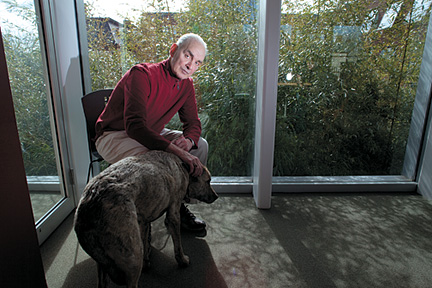
I began to lose weight and developed a slight tremor in my left hand. I cut back on alcohol, but that didn't seem to make any difference. If I had not been so preoccupied with other things, I would have realized that my quite ordinary athletic activities were coming to an end. Was there something big the matter with me? I often wondered, always vaguely, but dreading the answer. Sometimes I seemed to have trouble being fully conscious of myself in relation to my environment, as if I moved through my daily rounds on automatic pilot.
In the fall of 2004, my wife, Sarah, and I spent a pleasant weekend with a doctor friend outside New York City. We put in a long afternoon at the New York Botanical Garden, a favorite site. Our friend observed me closely. At the end of our visit she took Sarah aside and told her soberly that I ought to see a neurologist. So of course I did.
My preliminary research told me that Parkinson's was overwhelmingly likely, so I wasn't surprised when that was the diagnosis. Parkinson's can be determined only through a patient's symptoms. There is no foolproof, definitive scientific test. The doctor grabbed me from behind. His little tug almost pulled me over. My walk and my tremor were also common to Parkinson's.
When he told me, I was quietly devastated, but the doctor was upbeat. "Let me tell you something," he said. "I'll bet you anything you want to put up that you'll die of something else."
At the time that seemed like cold comfort. Almost six years later, however, I often think of his words.
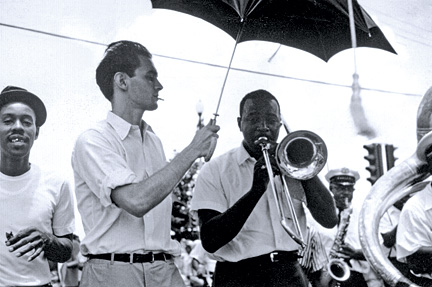
After I discovered that I had Parkinson's, the first consideration I faced was practical and immediate: Could I continue teaching, or should I retire? I simply couldn't imagine what that would be like. What would I do all day? Would I get depressed? Would I be able to continue writing history? (Then: Did I want to write more history?) My students seemed to like me, and their warm feelings about my teaching fed my self-esteem. Could I do without that? What would I do? What would my days be like?
As it turned out, on balance I was glad to be done with lecturing. I had pretty much taught all of Russian history for almost forty years, lecturing on everything from the emergence of the Slavs as a definable Eurasian culture all the way through to the end of the Soviet Union and into the Putin era. My decision to range this widely was part of my chosen dilettantism, but it had its drawbacks. I had never been able to keep up with even the most important new scholarship for this entire span, and I often found myself with only an hour or two to spend tweaking my last year's lecture, or at best reading a new article or book on some aspect of the enormous range of political and cultural problems involved in whatever my chosen lecture subject was that day.
I had a bad conscience about that. Even if last year's lecture tarted up a bit went over perfectly well, I increasingly felt I was just fooling my students. Lacking anything truly new to say, I had to psych myself up now before lectures, like an athlete getting ready for some important ball game. I was eager for something new that would draw on areas of experience and expertise that I knew I still had. But what would it be? Initially the future was a completely blank screen. I was scared.
Meanwhile, my analytic capabilities were slowly eroding. If I didn't have detailed notes, I might suddenly lose my way in building a case for some central point in a lecture. I had to have every name written down. And I had trouble with sequences. I could follow directions, to take a different kind of example, and drive to someone's house. But if there were many twists and turns, I had trouble doing the trip in reverse.
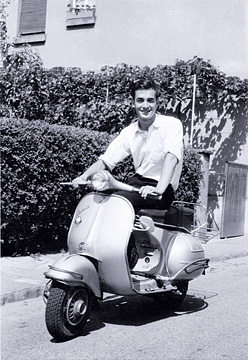
Concentration became more difficult. Particularly as my dopamine dosage increased, I found myself daydreaming for long minutes in my study, then struggling to find my way back to my thought. I fell asleep a few times while working on my own lectures. "I'm starting to bore myself," I thought. "This has got to be a bad sign."
Less meticulously prepared and with erratic memory, I began to wing it more in class. Perhaps surprisingly, students seemed to accept my new, less inhibited style, even like it. But I wasn't sure I did. More and more often, I found myself wondering what I would say next, and not finding out until I said it. I decided I should quit while I was ahead.
Ending my career as a lecturer relieved what I gradually discovered to be the pressure I had been under. I still had plenty to do, plenty of room for volunteer work of one kind or another with both graduate students and undergrads. The Watson Institute for International Studies did not immediately rescind my office space. The Slavic department, unlike the history department, still wanted at least my limited participation in teaching and administration.
I was now free to focus on teaching individual students, and on projects that particularly interested me. One was an undergraduate honors thesis on the Czechoslovakian rock group the Plastic People of the Universe. Their intransigence, when confronted by Communist hostility to their bohemianism, helped inspire the Charter 77 resistance to the Communist government that became so important at the end of the 1970s. My student, Brian Corcoran '06, learned Czech and traveled twice to Prague, just to write an undergraduate honors thesis on the Czech jazz and rock scene of the time.
I worked with another student, Christina Koningisor '07, a good-natured dynamo with a love of travel and a lawyer's gift for argument, who went to Sierra Leone to investigate how the local people were relating to the constitutional court established there after the genocide and civil war of the 1990s. To many of the locals, the court didn't seem to be a real part of the world they lived in, she concluded, in a memorable essay she wrote for the Royce Fellowship program.
Yet another student, Anna Hermann '08, produced a monumental study of the re-education camps that the U.S. government had set up in Rhode Island for German prisoners during World War II.
As the number of students I was responsible for dwindled, I could supervise them more carefully, think more deeply about their projects. All the while I kept wondering whether somebody would come along and tell me: "You're a Russian historian! You can't do this stuff." But nobody did.
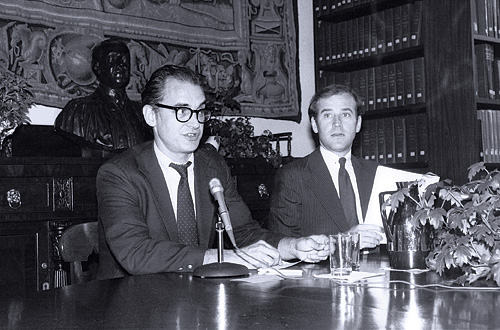
Old age, as somebody remarked to me the other day, is a full-time job. It's not a particularly satisfying job either: it's embarrassing, even shameful. You lose control of your body. I can't go around a corner without bumping into the doorjamb. I come downstairs as if I'm walking on eggs. Reading demands more focus and tires me out sooner. There is less you can do for people, which causes the ego to suffer. You give up various abilities, capacities, and ambitions. Some things were easy to give up. I biked and jogged for many years, but I don't miss them—especially jogging. I don't exactly miss tennis and squash, but I miss loving them and the now long-ago period when I played them quite well.
Curiously enough, despite diminished capacity, you remain—or feel that you remain—the same person. In my experience, people are right when they say that inside every old person a young one is hidden. But that young person is a prisoner, held incognito with no hope of escape. After five years of "retirement," I am medically pretty stable. But doing analytical work is ever more difficult, wearing me out more quickly. Shifting intellectual gears is harder, and so is remembering names, especially out of context. Sometimes it seems that a kind of translucent veil has been drawn between my consciousness and the outside world. My gait is labored. I have lost what Oliver Sacks, quoting William Harvey, calls "the silent music of the body."
Nevertheless, accepting that most of life's adventures are past—except the big one, of course—is less difficult than I thought it would be. There is more satisfaction in becoming a spectator: I watch birds at the feeder and observe my children's lives unfold. I cheered as the Red Sox deep-sixed the Curse of the Bambino. Yet my world is shrinking. Isolation, resignation, acceptance—I think I can deal with all that.
When I look into the mirror now I see my parents as they were in old age, and not as their young and healthy selves. This confuses me. Why only now am I discovering the full extent of their connection with me? These were people I loved, people who exasperated me. Sometimes I hated them. I struggled to establish my independence from them, came back to take care of them, and in the end grieved for them. How peculiar that I have now become them. Or at least become more deeply aware of my resemblance to them, both in looks and behavior. What a paradoxical thing our youthful revolts are! "And the end of all our exploring," wrote T.S. Eliot, "will be to arrive where we started." With greater knowledge? Perhaps.
So now academic life goes on in a slowly attenuating version of its accustomed way: graduate students finish up, articles and reviews get written. My last books are done, one a memoir, one a collection of solicited articles covering all of Russian history. "Scribble, scribble, scribble, Mr. Gibbon, eh?" as George III is supposed to have said to the great historian of late Rome when he bumped into him in the park. Now it is our third dog, Louis, getting a little old and stiff himself, who accompanies me to my last university office, in the Watson Institute, which I helped shape over the years, beginning in the early 1980s.
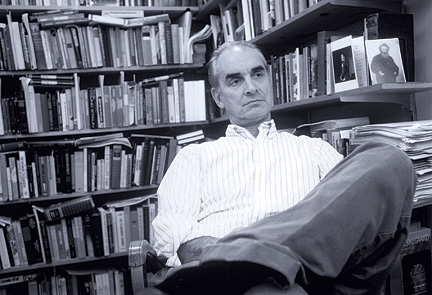
I was certainly onto something long ago when I signed on to the academy. I needed an education, and I got it by learning how to help educate others. I needed to discover how many ways there are of being intelligent, how many ways of being open to the world. I learned that it is better to teach your students how to show what they can do than to demonstrate to them what you can do. I learned how deeply and intricately success and failure are related to each other and not the polar opposites I had assumed they were when I was young.
My musical snobberies have become attenuated along with my prideful academic passions. Louis Armstrong taught me that a person can be a great artist and a popular entertainer at the same time. What now gives me pleasure has broadened beyond Bach, Beethoven, Brahms, and bebop, my four B's. (Actually five, if you count Bartok.) First came Irish and Scottish traditional music; then the dam burst. Bluegrass, rock—God knows what!
After almost a decade of searching, my son Nick married a lovely woman and took his business, CitySoft, to San Francisco. In 2006, when we were visiting them, he gave Sarah and me a remarkable album of music called Old & In the Way. Being on the point of turning sixty-eight and having just decided to retire, I found the title promising. It was bluegrass music, but with Jerry Garcia of the Grateful Dead on banjo. It had been recorded in 1973, and it was great. It swung, almost like jazz. It had pathos, which I was finally beginning to be able to accept. So rock and bluegrass finally came together for me, more than a quarter century late. The final interior wall of Fortress High Standards was breached. Blackbeard the Pirate (Jerry Garcia) was staring fixedly at me, but with a grin on his face. I tried to grin back.
"Deathbed conversion," I muttered, hoping it wasn't, quite.
Adapted from A Liberal Education, published in February by TidePool Press. Available online at www.tidepoolpress.com.





